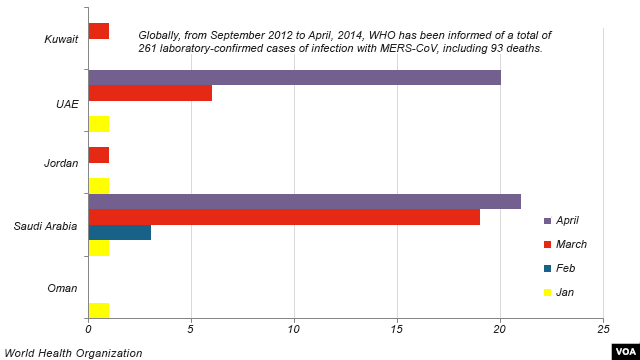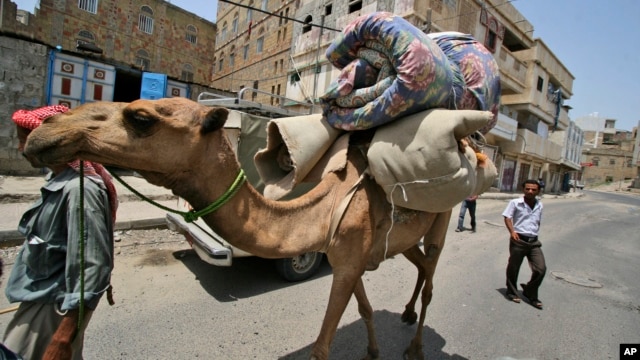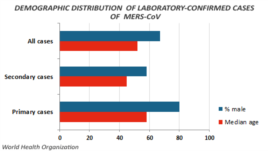Earth Watch Report - Biological Hazards

.....
.....
|
|
| Description |
| A
40-year-old man from Oman with underlying medical conditions. He was
1st admitted to a hospital in Muscat on [15 Feb 2014] and was then
readmitted to hospital in Abu Dhabi on (17 Mar 2014). His condition
deteriorated, and he died on (24 Mar 2014). Laboratory-confirmation was
done on (21 Mar 2014). The patient had no history of recent travel
outside of Oman and the UAE and had no reported contact with animals or a
laboratory-confirmed case. Further epidemiological investigation in
ongoing. |
| Biohazard name: | MERS-COv |
| Biohazard level: | 4/4 Hazardous |
| Biohazard desc.: | Viruses
and bacteria that cause severe to fatal disease in humans, and for
which vaccines or other treatments are not available, such as Bolivian
and Argentine hemorrhagic fevers, H5N1(bird flu), Dengue hemorrhagic
fever, Marburg virus, Ebola virus, hantaviruses, Lassa fever,
Crimean-Congo hemorrhagic fever, and other hemorrhagic or unidentified
diseases. When dealing with biological hazards at this level the use of a
Hazmat suit and a self-contained oxygen supply is mandatory. The
entrance and exit of a Level Four biolab will contain multiple showers, a
vacuum room, an ultraviolet light room, autonomous detection system,
and other safety precautions designed to destroy all traces of the
biohazard. Multiple airlocks are employed and are electronically secured
to prevent both doors opening at the same time. All air and water
service going to and coming from a Biosafety Level 4 (P4) lab will
undergo similar decontamination procedures to eliminate the possibility
of an accidental release. |
| Symptoms: | |
| Status: | confirmed |
|
|
.....
Muscat -
A
40 year old Omani man with 'underlying medical conditions' died of
Middle East Respiratory Syndrome Coronavirus (MERS-CoV) in Abu Dhabi on
Monday.
The World Health Organization (WHO) said that the
man was first admitted in a hospital in Muscat on February 15, and then
readmitted to a hospital in Abu Dhabi on March 17. “His condition
deteriorated and he died on March 24,” the WHO added in a statement.
Read More Here
.....
Disease Outbreak News
26 March 2014 -
On 23 March 2014, the National IHR Focal Point of the United Arab
Emirates (UAE) notified WHO of an additional laboratory-confirmed case
of infection with Middle East respiratory syndrome coronavirus
(MERS-CoV).
Details of the case provided to WHO are as follows:
- A
40 year-old man from Oman with underlying medical conditions. He was
first admitted to a hospital in Muscat on 15 February and was then
readmitted to hospital in Abu Dhabi on 17 March. His condition
deteriorated and he died on 24 March 2014. Laboratory-confirmation was
done on 21 March. The patient had no history of recent travel outside of
Oman and the UAE, and had no reported contact with animals or a
laboratory-confirmed case. Further epidemiological investigation in
ongoing.
Globally, from
September 2012 to date, WHO has been informed of a total of 200
laboratory-confirmed cases of infection with MERS-CoV, including 85
deaths.
WHO advice
Based on the
current situation and available information, WHO encourages all Member
States to continue their surveillance for severe acute respiratory
infections (SARI) and to carefully review any unusual patterns.
Infection
prevention and control measures are critical to prevent the possible
spread of MERS-CoV in health care facilities. Health-care facilities
that provide for patients suspected or confirmed to be infected with
MERS-CoV infection should take appropriate measures to decrease the risk
of transmission of the virus from an infected patient to other
patients, health-care workers and visitors. Health care workers should
be educated, trained and refreshed with skills on infection prevention
and control.
It is not always possible to identify patients with
MERS-CoV early because some have mild or unusual symptoms. For this
reason, it is important that health-care workers apply standard
precautions consistently with all patients – regardless of their
diagnosis – in all work practices all the time.
Droplet
precautions should be added to the standard precautions when providing
care to all patients with symptoms of acute respiratory infection.
Contact precautions and eye protection should be added when caring for
probable or confirmed cases of MERS-CoV infection. Airborne precautions
should be applied when performing aerosol generating procedures.
Patients
should be managed as potentially infected when the clinical and
epidemiological clues strongly suggest MERS-CoV, even if an initial test
on a nasopharyngeal swab is negative. Repeat testing should be done
when the initial testing is negative, preferably on specimens from the
lower respiratory tract.
Health-care providers are advised to
maintain vigilance. Recent travellers returning from the Middle East who
develop SARI should be tested for MERS-CoV as advised in the current
surveillance recommendations. All Member States are reminded to promptly
assess and notify WHO of any new case of infection with MERS-CoV, along
with information about potential exposures that may have resulted in
infection and a description of the clinical course. Investigation into
the source of exposure should promptly be initiated to identify the mode
of exposure, so that further transmission of the virus can be
prevented.
People at high risk of severe disease due to MERS-CoV
should avoid close contact with animals when visiting farms or barn
areas where the virus is known to be potentially circulating. For the
general public, when visiting a farm or a barn, general hygiene
measures, such as regular hand washing before and after touching
animals, avoiding contact with sick animals, and following food hygiene
practices, should be adhered to.
WHO does not advise special
screening at points of entry with regard to this event nor does it
currently recommend the application of any travel or trade restrictions.
.....
by Times Of Oman News Service | March 26, 2014 , 6 : 56 pm GST
|
| |
Muscat:
A 40-year-old Omani died in UAE due to Middle East Respiratory Syndrome
Coronavirus (MERS-CoV), according to World Health Organisation (WHO).
The
WHO said that the citizen was first admitted to a hospital in Muscat on
February 15 and was then readmitted to hospital in Abu Dhabi on March
17. "His condition deteriorated in Abu Dhabi hospital and he died on
March 24," the WHO said.
A laboratory-confirmation was done on
March 21. The patient had no history of recent travel outside of Oman
and the UAE, and had no reported contact with animals or a
laboratory-confirmed case. "Further epidemiological investigation is
going on," the WHO said.
Globally, from September 2012, WHO has
been informed of a total of 200 laboratory-confirmed cases of infection
with MERS-CoV, including 85 deaths.
In Oman, the MERS-CoV has claimed life of two people.
A
59-year-old patient who was under treatment died on December and the
Sultanate's first MERS coronavirus patient died on November 10, 2013.
The
first MERS-CoV victim, who was admitted to the hospital in Nizwa was
suffering from diabetes and high blood pressure while the second victim
died of lung failure.
Read More Here |
.....




















